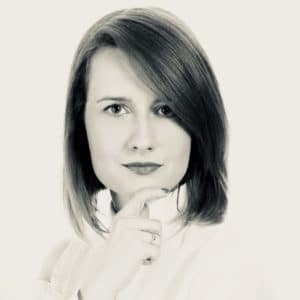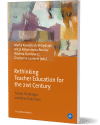What are the current trends, potential challenges and further developments of teacher education and professional development? Rethinking Teacher Education for the 21st Century. Trends, Challenges and New Directions by Marta Kowalczuk-Walędziak, Alicja Korzeniecka-Bondar, Wioleta Danilewicz and Gracienne Lauwers (eds.) focuses on this question from a theoretical, empirical and practical point of view. It provides valuable and fresh insights from research studies and examples of best practices from Europe and all over the world. The authors deal with the strengths and limitations of different models, strategies, approaches and policies related to teacher education and professional development in and for changing times.
Marta Kowalczuk-Walędziak took the time to reply to our 5 questions! Before we start, here is a short CV in her own words:

Marta Kowalczuk-Walędziak (Ph.D.) works at the Faculty of Pedagogy and Psychology, University of Bialystok, Poland. Her main research interests focus on the impact of higher research degrees on teachers’ professional development, linking educational theory and practice (practitioner research), and the sense of social agency of educational professionals. She is a member of the Administrative Council of the Association for Teacher Education in Europe (ATEE). She serves on the editorial board of the Eastern European Journal of Transnational Relations, and is an associate editor of the Polish Journal of Educational Studies. In 2016, she was awarded a Scholarship for Outstanding Young Scientists from the Ministry of Science and Higher Education in Poland (2016–2019). In 2019, she was a short-term visiting professor at the Department of Human and Social Sciences at the University of Bergamo, Italy. The results of her recent studies have been published in distinguished journals such as Educational Research and Teaching Education.
1) What will be the main challenge for your research field in the coming years?
There is no doubt that the teaching profession is one of the most important and at the same time most challenging professions in the world. It is teachers who have a great (perhaps even the greatest) influence on the intellectual capacities, the form and the functioning of future societies. What the teacher says or does in the classroom affects students’ knowledge, beliefs, attitudes, emotions, future interests, choices and passions. But it may also have the opposite effect: It may lower students’ self-esteem and discourage them from developing and accepting future challenges. Thus, current schools need highly qualified, knowledgeable and research-skilful teachers who will be capable of adequately preparing students to live and work in this changing environment. Therefore, the most urgent questions that should be addressed by researchers, policy makers and teacher educators are: What kind of teacher education and professional development do contemporary teachers need? What is the impact of teacher education and professional development on teaching practices, teacher quality and student learning outcomes? What is the role of research into teacher education and professional development? What competences do teacher educators need to better prepare teachers for new challenges?
2) Why would anyone want to pursue research in your field?
Despite the increase in teacher education research in recent decades, many problems – as mentioned above – still remain open and unsolved, so new, current research projects are necessary in the field of teacher education, carried out by researchers with broad explorative and methodological horizons, courageous and not afraid to tackle issues which are controversial and complex yet highly important for the development of educational theory and practice. The practical utility of educational research, its possible influence on practice and being “secondary” to practice (which, however, does not mean subordination but mutual support and inspiration in view of improved future education) is what I find most fascinating in this kind of research.
3) Why did you choose your research field? What motivates you in your field in particular?
My scientific interests relate particularly to the relationship between research and practice and research-based teacher education. I am interested in how research may shape teaching practice and how practice may shape research. Although this issue has been the object of educational debates and discussions for many years, it still involves many tensions and contested areas of debate. Therefore, I intended to explore it further through the analysis of experiences of teachers who for one reason of another have decided to obtain higher-degrees by research (at master’s or doctoral level). From this research it is more and more obvious that we as researchers and teacher educators should stop asking teachers whether educational research is useful for practice (many of them highly evaluate its usefulness), but our effort should be oriented at how to help (or educate) teachers to transfer research-based knowledge to their practice and do their own research in classroom settings.
4) Which (academic) book has influenced you the most?
It is a very difficult question. The process of my becoming a researcher was shaped by many books and articles on research methodology and teacher education as well as contacts with many fantastic people that I have met in my career. However, for the last few days, I have been reading with great interest the book The Role of Knowledge Brokers in Education. Connecting the Dots Between Research and Practice edited by J. Malin and Ch. Brown (2019), Routledge: London. What I found really valuable in this book is that the authors did not only present the challenges of connecting research to practice (which is typical in research in this field), but they also provided interesting proposals for tools, strategies and insights on how to address these challenges.
5) This is why I am author with Barbara Budrich:
Quick publishing process, professional consultancy at each stage of preparing the book, flexible approach to different needs of the authors, and very friendly staff!
Published by Budrich:
 Marta Kowalczuk-Walędziak, Alicja Korzeniecka-Bondar, Wioleta Danilewicz, Gracienne Lauwers (eds.): Rethinking Teacher Education for the 21st Century. Trends, Challenges and New Directions
Marta Kowalczuk-Walędziak, Alicja Korzeniecka-Bondar, Wioleta Danilewicz, Gracienne Lauwers (eds.): Rethinking Teacher Education for the 21st Century. Trends, Challenges and New Directions
© header image: Sketchify , created with canva.com; author’s photo: Marta Kowalczuk-Walędziak

